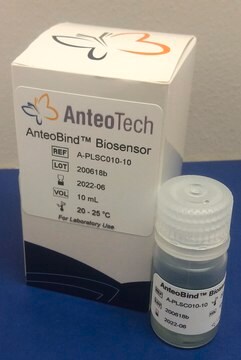641731
Titanium silicon oxide
nanopowder, <50 nm particle size (BET), 99.8% trace metals basis
Sinónimos:
Silicon titanate, Silicon titanium oxide, Titanium silicate
About This Item
Productos recomendados
Quality Level
assay
99.8% trace metals basis
form
nanopowder
reaction suitability
reagent type: catalyst
core: titanium
particle size
<50 nm (BET)
density
3.39 g/mL at 25 °C (lit.)
SMILES string
[Ti+4].[O-][Si]([O-])([O-])[O-]
InChI
1S/O4Si.Ti/c1-5(2,3)4;/q-4;+4
InChI key
CFRNXBBHKHHBQM-UHFFFAOYSA-N
Other Notes
Legal Information
Storage Class
13 - Non Combustible Solids
wgk_germany
nwg
flash_point_f
Not applicable
flash_point_c
Not applicable
ppe
dust mask type N95 (US), Eyeshields, Gloves
Elija entre una de las versiones más recientes:
¿Ya tiene este producto?
Encuentre la documentación para los productos que ha comprado recientemente en la Biblioteca de documentos.
Los clientes también vieron
Artículos
Among various ceramics, one-dimensional (1-D) piezoelectric ceramics have attracted significant scientific attention for use in energy harvesting.
Electronically, it behaves as a wide band gap (3.2 eV) semiconductor and exhibits memristor properties.2 Optically, TiO2 has high opacity with a very high refractive index3 (>2.4), and it exhibits strong absorbance in the UV range.
The production of hydrogen by catalytic water splitting is important for a wide range of industries including renewable energy petroleum refining and for the production of methanol and ammonia in the chemical industry.
The past several decades have seen major advancements in the synthesis of metal nanomaterials. Most recently, controlled synthesis has become versatile enough to regulate the exact number of atoms and ligands of very small metal nanoparticles, referred to as “clusters”.
Nuestro equipo de científicos tiene experiencia en todas las áreas de investigación: Ciencias de la vida, Ciencia de los materiales, Síntesis química, Cromatografía, Analítica y muchas otras.
Póngase en contacto con el Servicio técnico![Poly[(p-phenylenevinylene)-alt-(2-methoxy-5-(2-ethylhexyloxy)-p-phenylenevinylene)]](/deepweb/assets/sigmaaldrich/product/structures/147/963/61b421da-530b-4acf-8851-ecb9492e90ba/640/61b421da-530b-4acf-8851-ecb9492e90ba.png)


![Poly[2-methoxy-5-(2-ethylhexyloxy)-1,4-phenylenevinylene] average Mn 40,000-70,000](/deepweb/assets/sigmaaldrich/product/structures/344/488/b8f8179d-3970-4deb-a754-adda88cdb36f/640/b8f8179d-3970-4deb-a754-adda88cdb36f.png)



